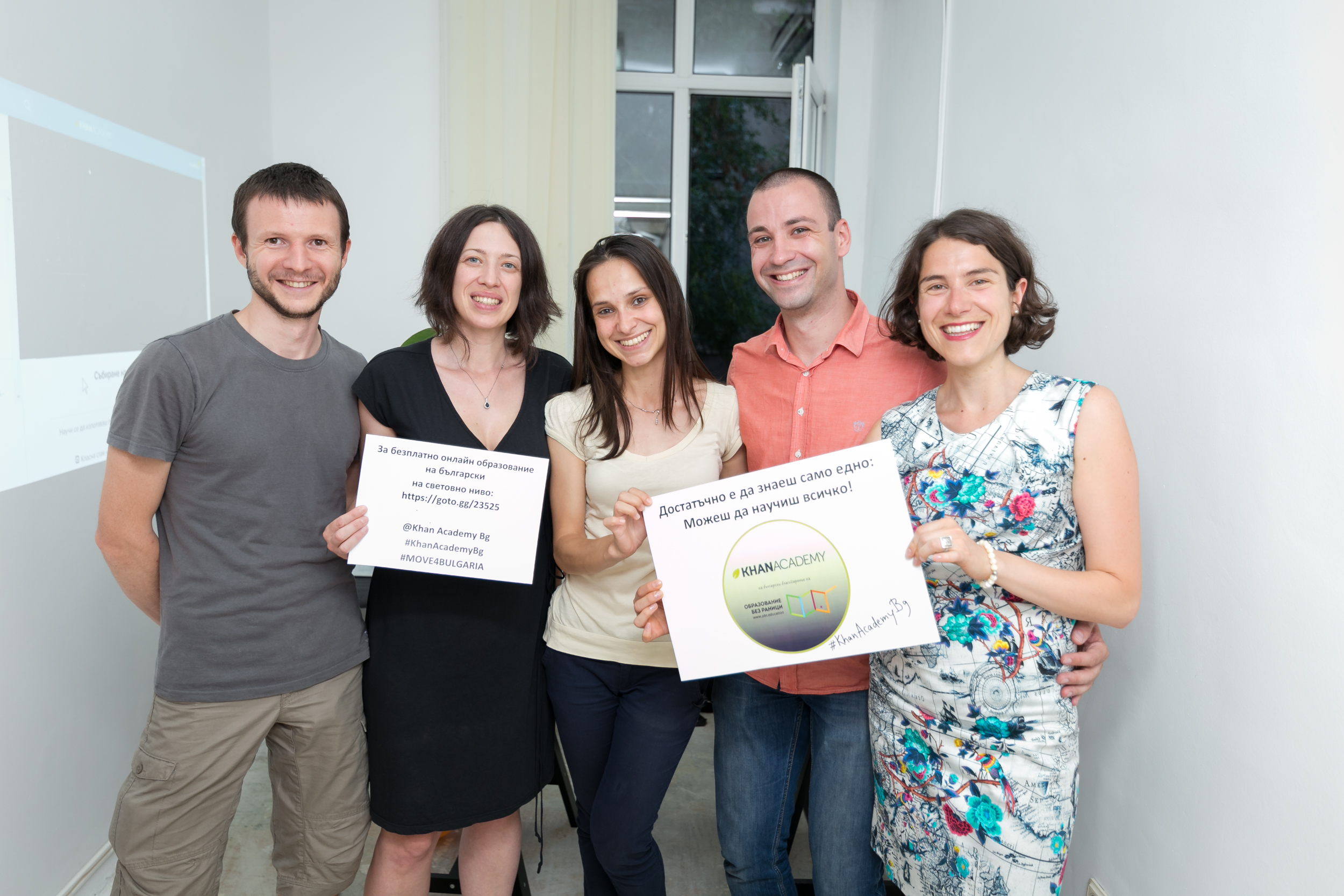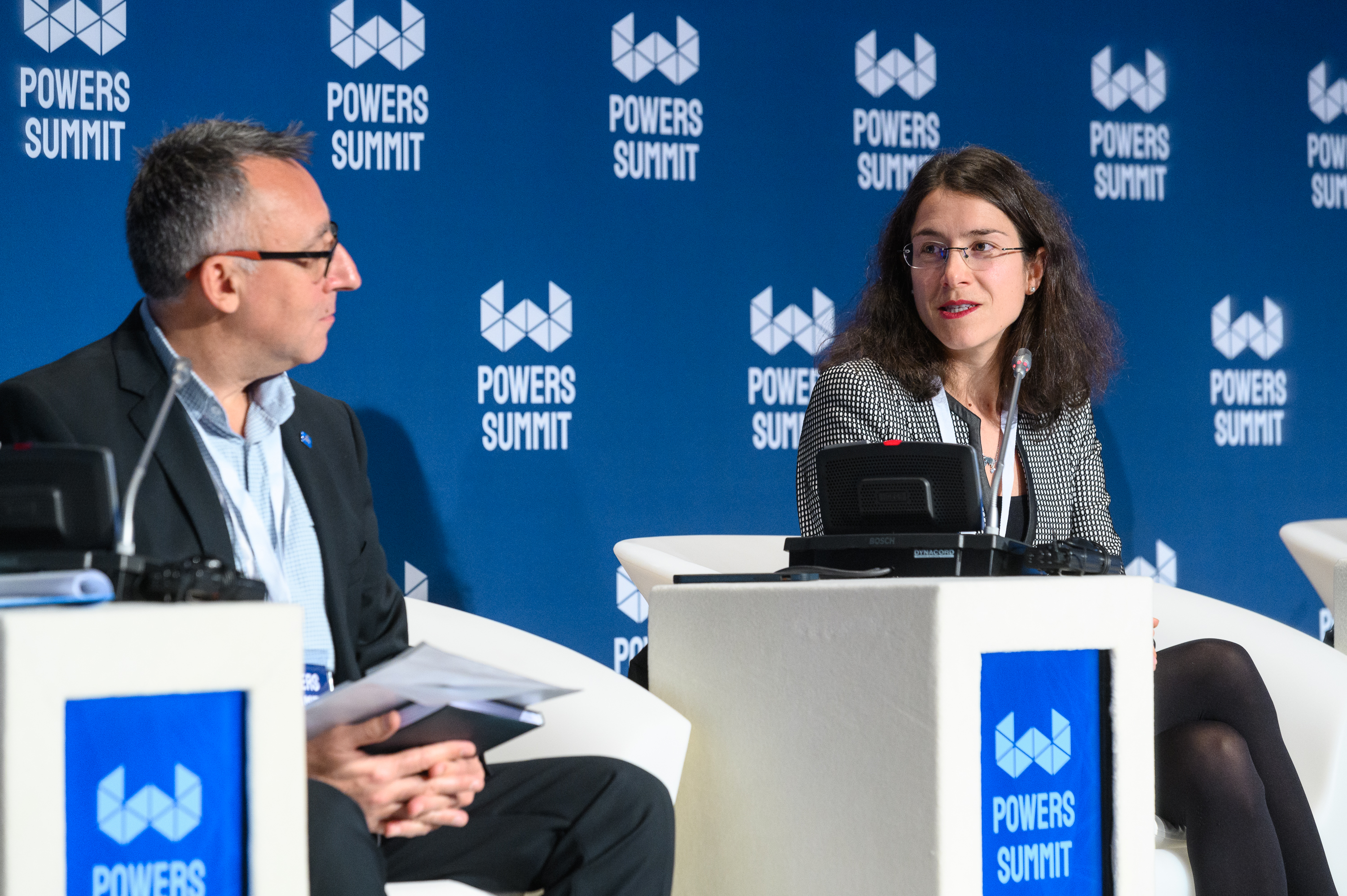Rozalina Laskova, CEO of the "Education Without Backpacks" and the Khan Academy in Bulgaria: a conversation about the education in Bulgaria and the support of social causes
Education is at the heart of the Questers Giving Programme and through the years we have had the privilege to collaborate with many amazing organizations that work to improve the schooling system in Bulgaria. One such example is "Education Without Backpacks" - the organization behind the Bulgarian version of Khan Academy, the world’s leading educational platform supporting 150+ millions of users all over the globe to get world-class education for free. We’ve recently supported their work and decided to invite their CEO - Rozalina Laskova, to share more about "Education Without Backpacks".
We can say a lot about Rozalina. She has worked in the fields of good governance, e-government, management of European Union funds, cultural policies, cultural and creative industries and arts; both in positions in the third sector and several ministries in Bulgaria and Germany. Rozalina holds a Master in Law from the Humboldt University in Berlin and an MBA from the University of National and World Economy in Sofia. She is a fellow of the Marshall Memorial Fellowship (GMF) and the Goerdeler-Kolleg for Good Governance (Robert Bosch Foundation, DGAP). Rozalina was included in Darik's "40 Under 40" ranking and is among the "People who are changing Bulgaria". Read on what she shared:
1. Hello, Rozalina! Could you tell us more about yourself and your professional career path?
I belong to the people who believe we could constantly work on making our country and our world a better and fairer place. I assume that is why I studied law. After my studies abroad, I returned to Bulgaria and started my career at the Bulgarian state administration, hoping to contribute to its modernization. The reason why I am currently working in the educational field is my belief that education is the main factor and the driver of success and wealthy life, both for each person and for the society as a whole. I am also an entrepreneur in the third sector. Besides the two non-profits I’ve led as a CEO, for several years I was also on the managing board of a Berlin-based association working in 40+ countries in Europe and beyond. Quite often these days I am thinking that it is probably even harder to lead and grow a non-profit start-up than a for-profit one – but this is probably a topic for a longer discussion.
2. Tell us why, when and how Khan Academy started in Bulgaria?
Khan Academy’s Bulgarian version is currently being developed by “Education Without Backpacks” using internal and external expertise and various donations for this cause. But it actually started as an initiative of individual volunteers who wanted to make this great educational resource accessible to all Bulgarians, in our own language.
Ivan Gospodinov was one of those first volunteers. Back then still a philosophy student at the Leipzig University, he discovered Khan Academy for math during his studies. When the Academy announced in 2011 that they are planning to open the platform for voluntary translations into the more popular world languages such as Spanish and French, he wrote an e-mail to the organization asking them to allow a Bulgarian translation too. After their positive response, he started attracting and coordinating volunteers interested in contributing to the translation of educational materials from Khan Academy. It is also important to mention that the platform TimeHeroes helped a lot for that (in 2022 they even awarded our organization for best practices in working with volunteers).
For all these years, 1000+ volunteers contributed to the Bulgarian version of Khan Academy. The most active among them founded “Education Without Backpacks” in December 2014. Since then, the organization, the team, the attracted donations and support are constantly growing, and thus – the Bulgarian version of Khan Academy, along with various support programmes for teachers, schools and the Ministry of Education in the field of digitalization.
3. Who are the people behind the Association "Education Without Backpacks"?
We are still a small organization consisting of 7 people in our operations team who coordinate a different number of external experts for various activities like translation, proofreading, expert reviews from teachers and other professionals, teachers‘ and students’ training, marketing, design, consulting services on the proper use of technologies, etc. In terms of legal structure, we are an association which currently has 11 members, most of which are the founders of the association. They elect a 2-year management board, which consists of 5 people who are actively involved and co-creating the strategy of “Education Without Backpacks”.
The people who bring “Education without Backpacks” to life come from various fields. Ivan Gospodinov, our chairman and leader of our teacher programs, is a philosophy teacher, an educational policies expert and a Teach for Bulgaria alumnus. Forbes Magazine recognized him in 2016 for his work in the field of education, as he was selected for their "30 Under 30" ranking. Other people who are or were at our voluntary management board are for example Daniel Cholakov – a data science professional working at a global tech consultancy and based in the USA, Maya Armyanova – a software developer with a vast professional experience from local Bulgarian IT companies to international giants like Google, Nikoleta Nikolaeva – a professional with a background in Japanese studies and an experienced proofreader but also networker and volunteer, Ross Borissov – a DevOps transformation leader, Angel Georgiev – who co-shapes also other educational initiatives such as Znam.be and SoftUni, Zhana Borissova – an entrepreneur in the field of translation services, Nikola Chernev – another entrepreneur in the field of education and STEM.
As for the great people from our operations team: Marieta, who is currently responsible for Khan Academy’s localization, is a psychologist who has worked with children and youth in various NGOs. Stanislava, our current Program Manager for teachers and schools programs, initially studied Marketing and worked on international training and educational projects for personal and professional development. Melli, our Operations Director, studied Japanese and worked for a large Japanese corporation before joining us. Svetlana Goranova and Tsvetomir Marinov recently joined our team working with teachers. Svetlana previously founded and led ”Zabavna matematika“ and Tsvetomir has great experience working with marginalized children. You could have a look at our team members’ bios at our website for more information and inspiration.

Although our constant operations team is small, both our ambitions and actions exceed what normal teams of the same size achieve in other areas. We are proud of this, but we are also looking for ways and support to grow the team, expand our impact and prevent the huge risk of burnout, which inevitably comes with the dedication to work towards changing the education system.
4. What is the greatest challenge you've faced since the association's founding?
Achieving sustainable funding so that we can ensure constant collaboration with an experienced team is an ever lasting challenge for every non-profit organization, especially in a country like Bulgaria, where the donation culture among individuals and companies needs to be further developed.
Of course, this is said from my perspective as a CEO. My colleagues may add further challenges to that like convincing the society, including parents, teachers and institutions, that a free product is definitely not a worse product, but just the opposite – it is the best product in the world for learning math and science; or the challenge to gather a team of 80+ of the best teachers in all school subjects to work in the mid-summer on an emergency project for the Ministry of Education.
5. You are an Executive Director of “Education Without Backpacks” and Khan Academy in Bulgaria, and one of your key roles is to inspire your team. How do you handle this task?
I assume I have it a little easier, as the main inspiration of my colleagues is the company’s mission, namely – world-class education for anyone and anywhere through Khan Academy, together with smart digitalization of (school) education in Bulgaria, utilizing any leading global product, any exciting and promising technology, including AI. These are not just empty words, and I can only be grateful to all of my colleagues that they so firmly believe in this mission, have fun working on achieving it and stay with us, despite the uncertainties related to funding, not competitive enough salaries and other issues that belong to the reality of the third sector.
I assume that I, as well as each of our board members, inspire the team by personal example – we just give our best at work every day. We are the first to act, we don’t give up even when it seems too difficult to achieve results, we welcome ideas and proactive attitude, and we insist that we need to lead by example also as an organization.
6. What are the long-term and short-term goals you have set in Khan Academy?
Our long-term goal stems from an alarming challenge we all face as a society – lower and lower grades and understanding of math across the students in Bulgaria. If in 2022 in more than half of the municipalities in Bulgaria the 7th graders couldn’t pass their math exam, then we have a huge problem not only with STEM learning, but also with the critical and analytical thinking skills of those young people. On the other hand, we have the best instrument in the world for learning math, namely Khan Academy. We know for sure (there are several studies and a lot of testimonials on that) that Khan Academy definitely improves students‘ math results, thanks to its mastery learning tools and the personalized learning and teaching it allows.
So based on this, starting from this year, our goal for the next three years is to reach and train all math teachers in Bulgaria on how to use Khan Academy effectively to better support their students. I think that even if we only work on solving the “math problem” I mentioned, we will do a lot for Bulgaria’s education.
But we won’t stop there, of course. Besides training teachers and working on pilot projects with schools in order to prove (in Bulgarian context) Khan Academy’s potential to fill in learning gaps and foster better results, we also plan to expand Khan Academy's content into Bulgarian with the great new middle school science courses which were released on the English version of the platform last year.
7. Can you share with us your predictions for the future of education in general and the implementation of technology in it?
 It is too difficult to make predictions at a moment when the tech industry starts to talk about the “AI pandemic”. AI has the potential to significantly alter our world, and we all who work in the sector have a huge responsibility to ensure the ethical use of AI and new technologies. How we approach this will determine whether these innovations become opportunities or threats to equal opportunities for all. I am optimistic. Khan Academy was among the first EdTech organizations to partner with OpenAI and explore the potential of GPT-4 to support teaching and learning – through the brand new Khanmigo instrument. I believe that this paves the way towards a future where the vision of “Education Without Backpacks” comes true – a modern, diverse and flexible educational environment that applies technologies in a meaningful way to develop students’ curiosity and potential. Because the end goal of education and of any action aimed at improving it should be to discover and develop humans’ potential in the best possible way.
It is too difficult to make predictions at a moment when the tech industry starts to talk about the “AI pandemic”. AI has the potential to significantly alter our world, and we all who work in the sector have a huge responsibility to ensure the ethical use of AI and new technologies. How we approach this will determine whether these innovations become opportunities or threats to equal opportunities for all. I am optimistic. Khan Academy was among the first EdTech organizations to partner with OpenAI and explore the potential of GPT-4 to support teaching and learning – through the brand new Khanmigo instrument. I believe that this paves the way towards a future where the vision of “Education Without Backpacks” comes true – a modern, diverse and flexible educational environment that applies technologies in a meaningful way to develop students’ curiosity and potential. Because the end goal of education and of any action aimed at improving it should be to discover and develop humans’ potential in the best possible way.
8. You are supported by companies in the country. How important is it for society, companies like Questers to be socially responsible and to help causes like yours develop further?
Education is the foundation of economic development, strong civil society, as well as of a happy and conscious life as an individual – to all of them! So from my perspective, it is too obvious why more and more socially responsible companies decide to make their impact investment into education. Still, it is not enough. If you have a look at our operational budget, you’ll think that we are making miracles out of nowhere. And yes, that‘s what we do, especially since the pandemic, when we were probably one of only 2 organizations to support the teachers in the country – for free! – to switch to online education (following a request of the Ministry of Education). And in the recent years, marked by a lack of political responsibility for major education reforms, including around digitalization, we are investing increasingly in supporting schools and institutions, without receiving any real government support for that.
Where institutions lack capacity or just don’t care, this is where “Education Without Backpacks” and other non-profit organizations take and need to continue taking the initiative and the responsibility. However, we cannot do this alone, at least not in the long run. We need not only companies’ financial support, but sometimes we also need some additional know-how, support and understanding of our role. We also prefer to be part of a bigger network. This allows us to take common advocacy actions for educational reforms which ultimately serve the business that suffers from a lack of qualified human capital. Moreover, by supporting education initiatives like ours, companies can help give quality education to everyone, which is a critical issue, as we need to utilize everyone's potential to live in a fair society and a flourishing economy that can withstand challenges such as pandemics, natural disasters, wars, new technologies and AI.

